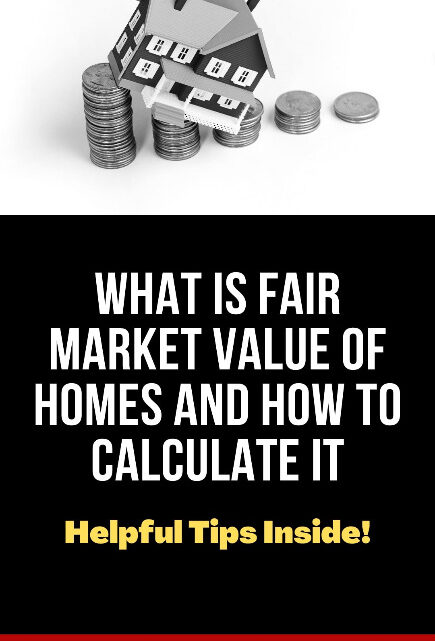Fair market value (FMV) is the price a seller is willing to accept, and a buyer is willing to pay for a property, considering all relevant factors and the current market conditions.
FMV is based on the balance between supply and demand and the property’s physical condition, amenities, challenges, and location.
When buying or selling a house, it’s essential to know its’ “fair market value” because it will inform the price range most likely to be set by the parties involved.
“What is the market value of my home” is one of the most asked questions from sellers to real estate agents.
Occasionally a buyer will pay more than what a real estate appraiser determines is the fair market value. In such circumstances, an appraisal gap will need to be addressed.
The specific factors to consider in determining FMV can change depending on the circumstances. For example, if the government takes the property, its FMV may require the application of defined criteria and standards.
You must talk to an eminent domain lawyer for just compensation in this situation. They can advise you on how FMV will be determined.
This article will discuss what “fair market value” is, how to compute it, and how to determine whether the value arrived at is truly market-driven.
What is “Fair Market Value”?
The price that a buyer and seller willingly and openly agree to based on the general state of the market at a given point in time and other relevant factors is called the “fair market value” of property.
But in most cases, the fair market value of a property is not set by actual market participants. Instead, an appraisal is ordered, and a professional appraiser gives an opinion of the property’s FMV based on specific standards and assumptions.
It’s important to know that an appraiser’s value in these situations is just his or her own opinion, which means that a different appraiser might come up with a different value. When this happens, the parties will have to resolve the value variance somehow.
How to Compute Fair Market Value
When computing fair market value, it is crucial to consider the following factors:
Market Conditions
A fair market value considers several factors, including current market conditions, interest rates, supply and demand for the property, physical condition, attributes, challenges, and location.
The cost of an item (including a given parcel of land) is determined by the number of potential purchasers in the market and the amount they are willing to pay.
Supply and demand, economic stability, and consumer confidence often impact purchase prices.
Property Condition
One of the most important things to consider when determining a property’s fair market value is its appearance. This means considering the property’s overall shape, size, terrain, appearance, the potential for development, and environmental condition.
To determine the property’s physical features and how they affect its value, you usually have to look at the property in person and find documents containing information about its physical features and problems.
Amenities and Challenges
When figuring out the FMV, it’s essential to consider both the property’s advantages and problems.
Amenities can be anything that makes a property more valuable and is recognized by the market as doing so. For example, a personal home might have a pool, a hot tub, a fitness center, a movie room in the basement, or a community center right next door.
On the other hand, challenges hurt or lower the property’s FMV in the market. In the case of a home, these factors might include a lack of expected upgrades, closeness to traffic or noise that the owner doesn’t like, or even the need for a new roof.
Location
Another factor for determining a property’s fair market value is its location. This is because location generally involves so many other elements that are important to buyers, such as the property’s taxing jurisdiction, where the schools are, and where other neighborhood amenities and municipal services may be found.
These factors can significantly impact the property’s fair market value and must be considered when computing the fair market value.
Comparable sales
Comparable sales are one of the most important things to consider when figuring out how much a property is worth on the open market.
In this method, you look into recent sales of properties in the market area similar to those valued.
Comparable sales are strong evidence of what similar properties will sell for because they show how much a buyer is willing to pay for a property.
When looking at comparable sales, it is essential to consider how the attributes of the comparable sale measure up (or compare) to the property being valued in terms of such factors as size, condition, location, amenities, etc.
Since no two properties are exactly alike, adjustments may need to be made to account for differences.
Market value is not computed by rudimentary valuation methods such as using price per square foot.
When is The Market at a Fair Value?
We all know that the real estate market fluctuates over time. In some years, it is up, and in some years, it is down. The determination of FMV follows these same trends and market forces.
When property exchanges hands in a down market, the seller will often feel that the value received is unfair. However, the same is true in an up or high market, when the buyer pays more for the property than it may have been worth even a few months earlier.
When the market does not appear unreasonably favoring either the buyer or seller, most market participants will feel that the value arrived at is fair.
Conclusion on FMV
When buying or selling real estate, understanding fair market value is essential. The market value of a property is the price a seller is willing to accept and a buyer is willing to pay, along with other vital factors like current market trends.
FMV is based on the balance between supply and demand, the property’s condition, amenities, challenges, and location.
FMV can also be affected by what happened when the property was taken, like if it was taken as part of an eminent domain action. In that case, it is essential to talk to an eminent domain lawyer who can advise you on determining the value.
About the author: The above article on fair market value and how do you calculate it was written by Leslie Fields. Leslie is the Executive Director of the Owner’s Counsel of America.











No Comment